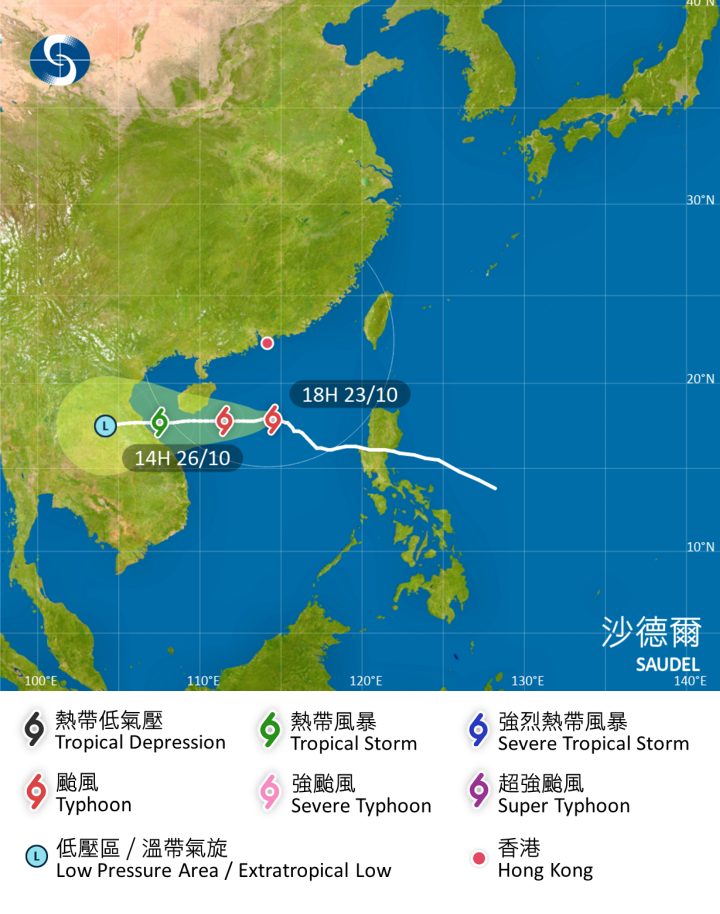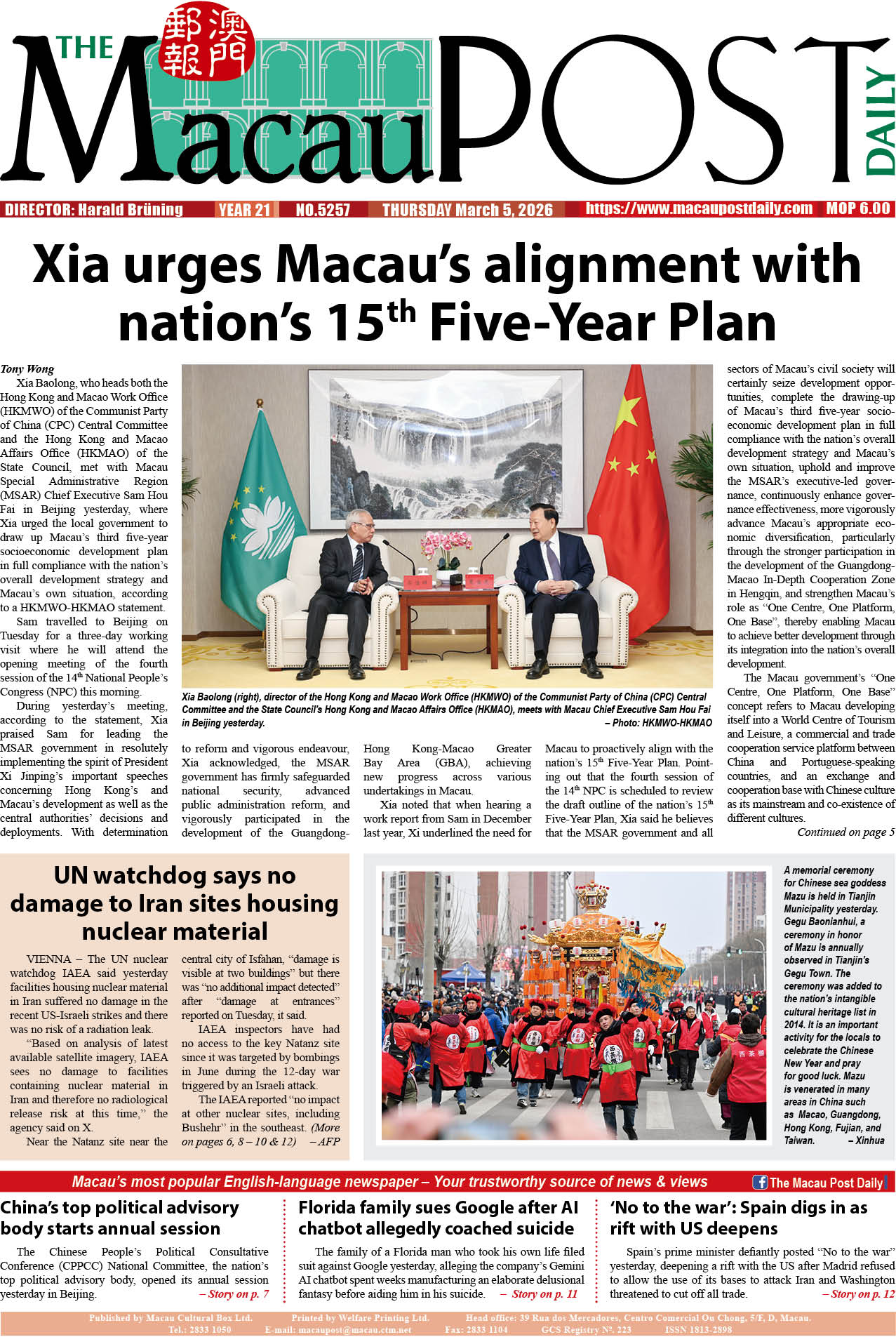Addressing yesterday’s daily press conference about Macau’s novel coronavirus pneumonia (NCP) situation, Lei Wai Seng, clinical director of the public Conde de São Januário Hospital Centre, said that the government will launch the third round of its facemask purchase scheme – at the fixed price of eight patacas for 10 facemasks for local residents and non-resident workers – today, which includes facemasks designed for children for the first time.
Under the scheme, the first and second rounds of which were launched on January 23 and February 2 respectively, both local residents and non-resident workers can each buy a maximum of 10 masks each time at designated outlets upon presentation of their Macau ID cards or work permits (“blue cards").
However, the third round includes facemasks for children for the first time. Each child can only buy five facemasks plus five adult facemasks each time, or alternatively parents can choose to buy 10 adult facemasks with their children’s ID cards, according to Lei, who said that the facemasks for children in this round are only for kids aged between three and eight.
Lei made the remarks yesterday evening at the Health Bureau (SSM).
There are 87 outlets, comprising designated pharmacies, the bureau’s health centres, and so-called service points run by three community associations, for the third round of the scheme which started this morning, two outlets less than the 89 outlets for the second round, Lei pointed out.
According to the bureau’s website, the 87 outlets for the third round comprise 56 designated pharmacies, eight health centres in Macau and Taipa and two health stations in Coloane run by the bureau, as well as 21 so-called service points run by the Macau Federation of Trade Unions (Gung Luen), Macau General Union of Neighbourhood Associations (Kai Fong) and Macau Women’s General Association (Fu Luen).
According to Lei, five million facemasks were sold during the first round of the government’s purchase scheme, while 5.6 million were sold during the second round, which ended yesterday.
According to the scheme, each resident and non-resident worker is entitled to buy 10 facemasks at the fixed price of 8 patacas (US$1) every 10 days.
The local government has managed to purchase one million face masks for children, Lei said. As the number of child facemasks is insufficient, the local government has decided that parents or legal guardians can only buy five child facemasks each time every 10 days, using their children’s ID cards, with the remaining five for adult facemasks, Lei said, adding that parents and legal guardians can choose to use the whole quota of 10 for adult facemasks if their children do not need to leave home so that they are not required to use any facemasks.
According to Lei, child facemasks are only sold at the bureau’s health centres and health stations. The price of child facemasks is the same as adult facemasks.
According to official statistics, 13.2 percent of Macau’s population at the end of 2018 was aged 14 and under.
Lei said that as the supply of child facemasks in the world is insufficient, the local government has decided that only the children in the “neediest” age group – those aged between three and eight – are eligible for the purchase of child facemasks. Lei said that children aged at least eight could use adult facemasks. Lei said that as the wearing of facemasks by children under the age of three could adversely affect their breathing capacity, the government was of the view that they should not wear facemasks, adding that children aged below three should currently always stay at home – unless necessary – to avoid being infected with NCP.
Lei urged residents who still have some facemasks that they had bought previously not to rush to buy new facemasks during the first few days after the third round of the scheme starts today, so as to reduce the risk of infection by joining crowds of people.
According to a statement by the government’s Novel Coronavirus Response and Coordination Centre last night, children who were born between February 13, 2011 and February 21, 2017 are eligible for the purchase of child facemasks.
According to Lei, the child facemasks sold by the government are all of the same size.
No more free facemasks at public medical institutions
Meanwhile, Lei also said that residents not wearing a facemask who enter the public hospital and the government’s health centres will no long be given a facemask for free from now, with the aim of ensuring that the limited number of facemasks can always be used by medical staff.
Lei urged residents who are seeking treatment at public medical institutions to always wear a mask when they leave home on their way to the facilities, as those without a facemask are not allowed to enter the premises.
Lei said that anyone who arrives at public medical institutions for treatment without a facemask will need to buy one there beforeentering the premises.
According to a statement by the bureau last night, those without a facemask who need to seek treatment at public medical institutions have to buy one there at a price of 10 patacas per facemask.
Lei also said that the government has decided to stop providing free facemasks at public medical institutions, as the government has discovered that some residents were repeatedly entering and leaving the public hospital and health centres merely with the aim of getting multiple facemasks for free.
Lei also said that the government has also discovered that someone on the Internet was teaching people how to pretend to be a patient and enter public medical facilities with the aim of getting more freefacemasks for their own use, adding that the new measure aims to stop cheating.
Loudhailers mistakenly spread anti-virus message at 2 a.m.
During yesterday’s press conference, Ma Chio Hong, who heads the Operations and Communications Division of the Public Security Police (PSP), admitted that the government’s megaphones – which are currently being used for spreading the anti-virus message – installed in the Patane, San Kio and Ha Van districts mistakenly got activated at 2 a.m. yesterday. Ma said the government was sorry for the incident that affected people’s sleep and rest. He did not say how long the incident, which reportedly robbed many residents of their sleep in the three districts, lasted.
Ha Van is the Chinese name for the Praia do Manduco neighbourhood in the Inner Harbour area near Barra.
The government started last Thursday to use loudhailers installed across the city to disseminate information on preventive measures against the virus. Vehicles fitted with megaphones have been driven around the city since then to spread the anti-virus message such as by urging residents to stay at home.
The loudhailers installed across the city and the megaphone-fitted vehicles operate between 10 a.m. and 8 p.m.
Ma said that until yesterday morning, the government had received 19 complaints from residents about yesterday’s early morning incident.
According to Ma, the provisional findings of an investigation show that the incident was due to computer programming faults. Ma was quick to add that the police did not rule out the possibility that the situation was due to a cyberattack, adding that the Public Security Police have therefore transferred the case to the Judiciary Police (PJ) for further investigation.








